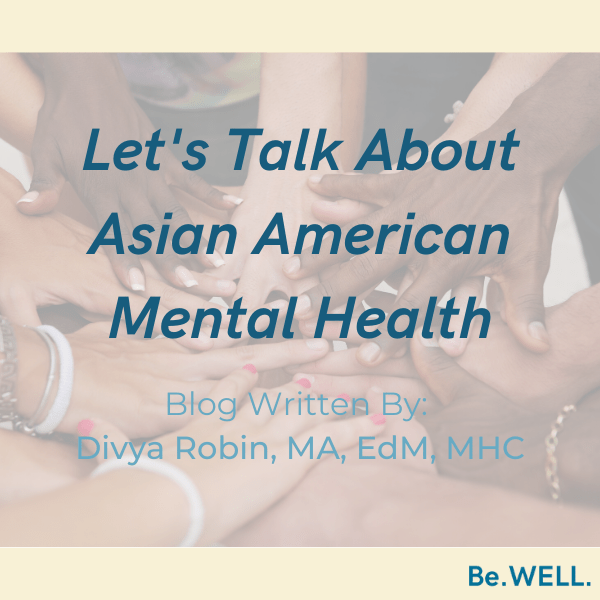July is Minority Mental Health Month, which is a month that acknowledges that mental health is illustrated differently based on your cultural background. It is also to bring awareness that minority communities are disproportionately affected and experience disparate levels of mental health care in comparison to the majority population in America. Additionally, many minority communities face a strong mental health stigma and lack of emotional language to discuss struggles. As a South Asian American therapist, this is something I have witnessed in both personal and clinical experiences, so today I would like to highlight Asian American Mental Health.
Mental health is not a cookie-cutter ‘one size fits all ‘concept. How can it be? When people come from diverse cultural backgrounds with various experiences, family dynamics, norms, and cultural expectations – there is no way that we can expect mental health will look similar for all. South Asians are one of the fastest-growing Asian immigrant groups in the United States, frequently referred to as the “model minority”. Speaking as a first-generation South Asian American, and as a therapist working with many clients of color, and first- and second-generation immigrants; I can validate the immense stress and challenges that these communities face. Some of the mental health struggles that are faced by the “model minorities” are anxiety associated with high achieving behaviors, the pressure to succeed and make the community proud, stress from balancing multiple cultural identities, uncertainty about “fitting into” American culture, intergenerational stress, depression, and isolation that can stem from not “fully belonging” to either American culture or (in my case) South Asian culture.
It is important to talk about the unique mental health experience that Asian Americans face because this topic is prevalent in our community. According to the National Alliance on Mental Illness, Asian American and Pacific Islander (AA/PI) Communities show higher levels of depressive symptoms than whites. Additionally, of the whole AA/PI community, South Asian Americans report the highest rates of depression. Depression is prevailing in the AA/PI community, and not knowing the causes and cures for mental health illness can make this topic even more difficult to discuss. Minority Mental Health Month is a time to further education and conversations regarding mental health and how it perceived in different communities so that as a minority community, there can be healing and a decrease in stigma.
Mental health is a stigmatized topic in the South Asian community and is often reinforced by the cultural norms to keep struggles a private matter – which leads to many people suffering in silence. Unlike the United States, which is an individualistic culture where mental health is more of an openly discussed topic, in the South Asian community is rooted in not disclosing when things were painful and not asking for help. The mindset that many Asian immigrants hold of needing to be ‘strong’ and ‘self-sufficient’ has been what was passed down to them from generations in the past and that emotional suppression is the method of coping. What emotional suppression does is actually endanger one’s health and well-being both physically and psychologically as well as cause more internal pain than if one were to acknowledge and feel the emotion (Tummala-Narra & Deshpande, 2018). The double-edged struggle in the Asian American community comes from having engrained behavioral and thought patterns that cultivates suffering in silence but also knowing that there is a route to heal the pain and live a happier life. What is meaningful to remember, is that for many past generations, mental healing and the alleviation of pain was not an option and emotional language was not something that was taught Asian households. This is why it is even more critical to promote awareness and conversion this month, to be advocates that there is a better and healthier way to live.
As a South Asian American, I recognize that my journey to healing and happiness looks very different than those of White Americans. I encourage all Asian Americans, first and second generation, to remember that it is okay to challenge the mental health stigma and start to have a conversation with older generations about this topic that they were forbidden to have growing up. Minority Mental Health Month is a time to have open and honest conversations about ways we can support one another in difficult times as well as share mental health resources. It is time to change attitudes and improve mental health outcomes in a significant way in the Asian American community.
References:
“Asian American and Pacific Islander (AA/PI) Community and Mental Health FACT SHEET.” National Alliance on Mental Illness, NAMI Multicultural & International Outreach Center, June 2003, www.naminys.org/images/uploads/pdfs/Asian%20American%20Community%20Mental%20Health%20Facts.pdf.
Tummala-Narra, P., & Deshpande, A. (2018). Mental Health Conditions Among South Asians in the United States. In Biopsychosocial approaches to understanding health in South Asian Americans (pp.171-192). Springer, Cham.



